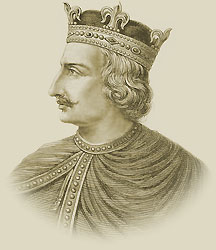Henry I
Henry I was King of England when the fourteen year-old John Uskglass arrived in England with his fairy army in 1110. At Christmas of that year, Henry I summoned the major nobles and clergy of his realm to discuss the fairy host's successful conquest of Newcastle, Durham, Carlisle and Lancaster. The council agreed that the campaign showed far more purposefulness than fairies were generally believed to have.
In January of 1111, at Newark on the banks of the river Trent, Henry I met and fought the fairy host. The human soldiers had to contend not only with the fairy army, but also Uskglass's magic; Henry I quickly lost the battle, whereupon the young Uskglass claimed the lands between the rivers Tweed (at the Scottish border) and Trent for his own. This was in restitution for the failure of either Henry I, or William II (King Henry's brother and predecessor) to avenge the death of Uskglass's father, whom Uskglass claimed had been murdered by one Hubert de Cotentin. Henry I was allowed however to keep the southern portion of England - solely because Uskglass had decided that the lands he had taken amounted to a "just recompense" for his grievance [45].
Notes
Henry is the first in the line of Norman kings established by William I thought to have been born in England, possibly in Yorkshire. More about King Henry can be found here.
